

Tao Te Ching
Search Sages
Enter all or part of an sage's name or biography in the fields below, then press tab or enter to filter the list of Authors. Click the headings Name or Biography to sort by that column. Diacritics are ignored when searching.
Click on the author's name to go to their page.
| Author Name | Biography |
|---|---|
| Yeshe Tsogyal | 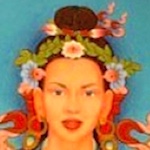 Yeshe Tsogyal Yeshe TsogyalBelieved to be the reincarnation of the Buddha's own mother, Yeshe Tsogyal is the most famous of the enlightened women of Tibet and considered a female Buddha manifesting in the world in a way to teach an enlightened path in everyday life. She appeared as ordinary girl, princess, prostitute, business woman, and enlightened guru. Given from the king, Trisong Detsen’s harem to Padmasambhava who freed her, she helped establish Buddhism in Tibet and concealed terma for future generations. |
| Yen Lingfeng | 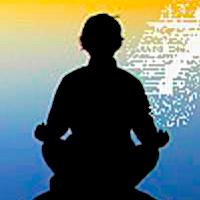 Yen Lingfeng Yen LingfengAuthor and Taoist scholar Scholar, author, and Tao Te Ching specialist, Yen Lingfeng wrote many of his own books as well as finding and republishing old commentaries thought to have been lost. To compile these, he researched and drew from many different sources. |
| Yayoi Kusama | 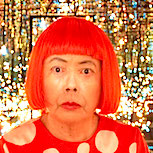 Yayoi Kusama Yayoi KusamaYayoi Kusama 草間 彌生 (1929 - ) One of the Top 10 Living Artists, 2014’s most popular artist of the year, precursor and inspiration to Andy Warhol and the pop art movement, film writer/start, published novelist and poet named the most popular living artist; almost 90-year-old Yayoi Kusama set a record for a female artist when one of her works sold at Christie’s in New York for $5.1 million. During the counterculture’s 1960s, she organized a series of events that included naked, brightly painted withpolka dots participants. One of the world’s most important voices for the avant-garde, she has lived in a Japanese mental institution since 1973 creating hallucination-inspired “infinity nets” while organizing some of the world’s most popular art exhibitions. After creating art every day for over 70 years, she says she’s feeling “as creative as ever,” that “my mind is full of paintings,” and “I, Kusama, am the modern Alice in Wonderland.” |
| Yang Xiong | 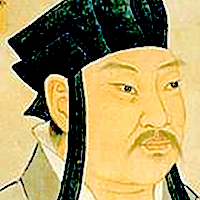 Yang Xiong Yang Xiong"Confucius from the western parts,” poet, philosopher, I Ching scholar, and politician; Yang Xiong became one of the most famous people of the entire Han dynasty. His most well-known and influential book was Exemplary Sayings (法言) which includes him in our lineage of aphorists. He took a middle-ground approach between Xunzi and Mencius describing basic human nature as neither basic goodness or basic badness characterizing it as a complex combination. |
| Yājñavalkya | 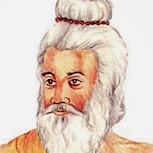 Yājñavalkya YājñavalkyaOne of the earliest non-dual philosophers Revered sage, major figure in the Upanishads, and one of the first philosophers in recorded history; no one could rival Yajnavalkya in debate. Called the greatest theologian of his time, and with his dialogues recorded in the Upanishads, he taught the great philosopher-king of Videha (modern day Nepal), Janaka who created an intellectual center for great sages that became the most important cultural and political center of South Asia. He described an “Absolute Self” and furthered a non-dual school of Hinduism that continues today. In later life he retired in a forest to become a wandering ascetic personifying a tradition popular through the centuries of Indian history. |
| Xun Kuang | 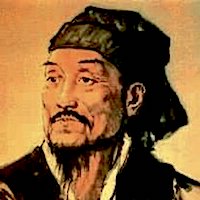 Xun Kuang Xun KuangEarly Confucian philosopher of "basic badness" An early Confucian philosopher, Xunzi had a big influence on the translation of Confucian ideas into governmental policy until Mencius assumed that role. He was one of the first to talk about Lao Tzu and used Taoist descriptions while arguing against the Taoist interpretations. Unlike most Chinese philosophers who began with a foundation of basic goodness, Xunzi—much like the Judeo-Christian traditions—taught that humans were basically evil, that strict ethical rules were necessary to prevent their natural tendencies, and that only an elite few could accomplish much. He rejected the idea of positive change in favor of a conservative return to the past's wisdom; but—perhaps in contradiction—recommended promotions based on merit instead of hereditary titles. |
| Xuanzong | 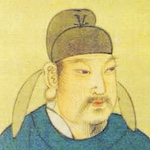 Xuanzong XuanzongTang emperor famous for many things including his poetry and calligraphy as well as establishing one of China’s golden ages. He was deeply interested and influenced by both the Taoist and Buddhist traditions and his long reign of 43 years was a period of peace, political stability, and economic prosperity with many advances in education, music, painting, sculpture, and literature. He wrote a commentary on the Tao Te Ching, Yu-chu tao-te-chen-ching and had others commissioned. |
| Xenophon of Athens | 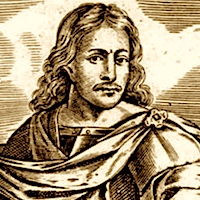 Xenophon of Athens Xenophon of AthensGeneral, Socratic biographer, philosopher Much like Plato, Xenophon was a student and biographer of Socrates. These two biographical descriptions (the only surviving examples of contemporary Socratic dialogue) differ widely however sparking an historical debate about what Socrates was really like. Bertrand Russel wrote that Xenophon “was not very liberally endowed with brains and on the whole conventional” (Others though like Montaigne, Rousseau, and Benjamin Franklin praised his intellect.) but also “the excellence of Plato as a writer of fiction throws doubt on him as a historian” so obscure mystery must remain surrounding Socrates. As a Greek general, historian, mercenary, as well as philosopher; Xenophon’s approach and descriptions reveal the more pragmatic and political view. |
| Xenophanes | 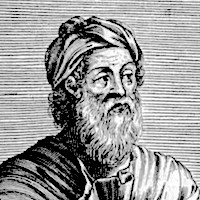 Xenophanes XenophanesNomad, belief-system critic, poet, and highly influential but greatly under-appreciated pre-Socratic Greek philosopher; Xenophanes traveled for 67 years teaching, "making enemies," and challenging traditional Greek values like athleticism and belief in anthropomorphic gods. Plato used many of his ideas in the Republic III, Aristotle deprecated him but then advanced many of his ideas when he wrote Metaphysics. Xenophanes realized early how stuck to tradition most contemporaries become and consciously wrote for future generations he believed (correctly) would be more open to his ideas. |
| Wu Zetian |  Wu Zetian Wu ZetianIn more than 4000 years of Chinese history, Wu was the only female emperor (not just consort or dowager). Historians accused her of violent acts - murder, torture and corruption; but this may be history being re-written by the victors, later Confucian successful attempts to discredit her and the feminine equality she promoted. She made the Tao Te Ching required reading for imperial university students and continued the Tang tradition of claiming Laozi as a clan ancestor. She supported self-sufficient farmers and ensured fair land allocations. Three of her sons also became emperors and one of her grandsons became the renowned Emperor Xuanzong of Tang. |
| Wu Cheng | 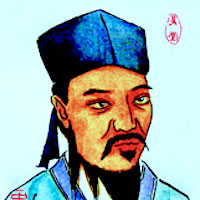 Wu Cheng Wu Cheng"Mr. Grass Hut"
|
| Woody Allen | 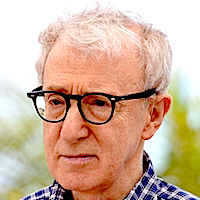 Woody Allen Woody AllenWoody Allen, Allan Stewart Konigsberg (1935 - ) |
| Witter Bynner | 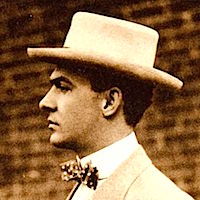 Witter Bynner Witter BynnerTranslator, poet, and scholar; Bynner traveled and lived in China, intensely studied Chinese culture, and worked for 11 years translating T'ang Dynasty poems. A student of George Santayana at Harvard, he was a conscientious objector during World War I, and championed the women’s suffrage movement. Writing more than 39 books himself, he also actively supported poets and artists becoming friends with D.H. Lawrence, Georgia O'Keeffe, Carl Sandburg, Ansel Adams, Willa Cather, Igor Stravinsky, Robert Frost, W. H. Auden, and Aldous Huxley. Sponsoring Kahlil Gibran, he helped him publish The Prophet. |
| Winston Churchill | 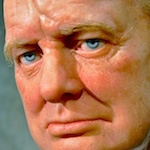 Winston Churchill Winston ChurchillAt the top of world politics for 50 years and one of the most influential leaders in all history, Churchill was also an accomplished artist, an author who won the Nobel Prize in Literature, and amateur bricklayer who bred butterflies. A Cassandra of his time, he very early and almost alone warned of Hitler and Nazi Germany, Stalin and the Soviet threat, and Gandhi’s approach to Indian Independence leading to the Islamic consequences we’re suffering today. Overcoming a serious speech impediment, his radio broadcasts and communications held Britain together when they were standing almost alone against Hitler, helped bring vital US support, and win WW II. |
| Wing-tsit Chan | 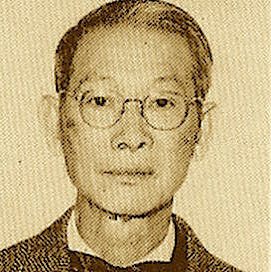 Wing-tsit Chan Wing-tsit ChanChinese academic, scholar and professor; Chan exemplifies the traditional, “objective” scholastic and led his life strictly in that mold getting a Ph.D. from Harvard and teaching in colleges the rest of his life while translating and writing hundreds of barely-read scholarly books and papers. An exception was his 1963 book, A Source Book in Chinese Philosophy that became an influential but dry source for the new academic field of Asian studies. Though probably not that full of understanding in itself, it exposed Westerners to quotations, names, and ideas with the potential to open doors of insight and wisdom. |
| William Wordsworth |  William Wordsworth William WordsworthOrphaned at an early age, connected with the common man while wandering through Europe on foot, caught up in both the ups and downs of the French Revolution, and Britain's only Poet Laureate who wrote no official verse; Wordsworth defined poetry as "the spontaneous overflow of powerful feelings” and along with Samuel Coleridge, used poems based in common language to help launch the Romantic Age of literature. A student of John "Walking" Stewart who blended yoga and Eastern wisdom from India with western pantheism, he published some of the most influential poetry in Western literature. |
| William Shakespeare | 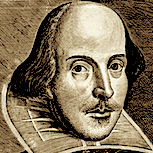 William Shakespeare William ShakespeareThe greatest writer in the English language whose works - 400 years after his death - have been translated into every living language and remain popular, respected, studied, and performed throughout the world; Shakespeare was as Ben Johnson wrote, "not of an age, but for all time.” When 18 years old, he had his first child 6 months after getting married and before long became a playwright and actor in his own and others’ plays. Unlike many of the prime movers on our biography lists, Shakespeare, though not revered, was successful during his lifetime (as a businessman) and by the time he was 33 while living in London owned the second largest home in Stratford. His influence not only revolutionized drama, scholars link more than 20,000 pieces of music to his writings, many famous paintings, his language helped shape modern English and common everyday phrases, Sigmund Freud drew heavily on him while developing his psychology theories, and Durant describes his influence as moving us to the depths of our spirit. |
| William Pelham Barr |  William Pelham Barr William Pelham BarrOne of the most corrupt of modern politicians One of the most corrupt and evil figures in the modern political world; Barr became the premier "fixer" for Reagan during the Iran-Contra scandal. He fought against LGBT and abortions rights as well as church vs. state separation; promoted religious nationalism, stricter death penalty laws, and the elevation of Catholicism in public education. As Attorney General during the Bush Administration, he supported strong "law and order" policies and even the abolishment of paroles. When Caspar Weinberger planned to testify that George H. W. Bush participated in the Iran-Contra scandal, Barr arranged for Bush to pardon him (and several other officials) as a way of preventing this testimony causing a second scandal known as Iraqgate. This led Independent Counsel Lawrence Walsh to call it "The Iran-contra cover-up" and NY Times reporter William Safire to nickname him "Coverup-General Barr". Barr's corrupting political and social influence spread after Donald Trump appointed him attorney general in 2019. |
| William of Ockham | 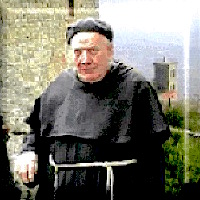 William of Ockham William of OckhamMajor intellectual figure during medieval times, Franciscan friar at the center of the biggest political controversies of his era, and famous for his principle now called Occam’s razor; William of Ockham’s commentaries were condemned by a council of bishops and he was commanded to defend himself at a papal court. Instead, he fled the country, took refuge with the Holy Roman Emperor, and was excommunicated. One of the first to encourage a strong separation between church and state, a liberal democratic ideology, and social contract theory; his Occam's Razor theory became a small-is-beautiful, less-is-more foundation for modern science and natural philosophy. |
| William Montgomery Watt | 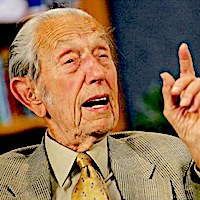 William Montgomery Watt William Montgomery Watt"The Last Orientalist" One of the most respected non-Muslim commentators on Islam, historian, Anglican priest and professor; Watt wrote classic biographies about Muhammad. He thought Muhammad was like an Old Testament prophet and emphasized his efforts to achieve more social justice. His books are criticized by Muslims who have a hard time appreciating Christianity and by Christians who have trouble appreciating Isla |